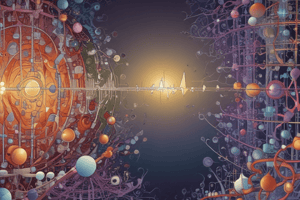Podcast
Questions and Answers
What does pharmacokinetics refer to?
What does pharmacokinetics refer to?
- The time course of drug concentrations in biological systems (correct)
- The study of drug discovery and design
- The therapeutic uses of drugs
- The routes of drug administration
Which process involves converting active drugs to more polar compounds for removal from the body?
Which process involves converting active drugs to more polar compounds for removal from the body?
- Oxidation
- Hydrolysis (correct)
- Passive diffusion
- Reduction
Which factor can influence the absorption of a drug in pharmacokinetics?
Which factor can influence the absorption of a drug in pharmacokinetics?
- Protein binding capacity
- Particle size (correct)
- Lipid solubility
- Target tissues
What is the primary mode of transport for small nonpolar molecules across cellular membranes?
What is the primary mode of transport for small nonpolar molecules across cellular membranes?
What is the main focus of membrane transport in pharmacology?
What is the main focus of membrane transport in pharmacology?
Which type of transport requires energy input to move molecules against their concentration gradient?
Which type of transport requires energy input to move molecules against their concentration gradient?
In pharmacokinetics, what do renal function and drug molecule polarity influence?
In pharmacokinetics, what do renal function and drug molecule polarity influence?
What does distribution in pharmacokinetics depend on?
What does distribution in pharmacokinetics depend on?
Which protein pumps facilitate the movement of large or charged molecules across cellular membranes?
Which protein pumps facilitate the movement of large or charged molecules across cellular membranes?
Why is understanding absorption important in pharmacokinetics?
Why is understanding absorption important in pharmacokinetics?
Study Notes
Pharmacology
Pharmacology is a branch of medicine concerned with the study of drugs and their effects on living organisms. It encompasses various aspects such as drug discovery, development, design, mode of action, mechanisms of toxicity, routes of administration, dosage regimens, and therapeutic uses. Let's delve into two key subcategories within this field: pharmacokinetics and membrane transport.
Pharmacokinetics
Pharmacokinetics refers to the time course of drug concentrations in biological systems and involves studying how a body absorbs, distributes, metabolizes, and excretes drugs. This knowledge helps determine whether a patient receives an effective dose of medication without experiencing side effects or overdoses due to poor absorption or rapid elimination, respectively. Key concepts within pharmacokinetics include:
-
Absorption: The process by which a drug enters the bloodstream after being administered to a patient via different routes like oral, intravenous, transdermal, etc.. Absorption can be influenced by factors such as pH levels, solubility, particle size, and the presence of food or other medications.
-
Distribution: Once absorbed, the drug spreads throughout the body, reaching target tissues and organs where it produces its therapeutic effects. Distribution depends on the drug's physiochemical properties like lipid solubility and protein binding capacity.
-
Metabolism: Drugs undergo biotransformation, often referred to as metabolism, in the liver through processes called oxidation, reduction, and hydrolysis. These reactions convert active drugs to more polar compounds, facilitating their removal from the body. Metabolites may have pharmacological activity themselves.
-
Excretion: Finally, once metabolic changes occur, the drug or its metabolite is expelled from the body primarily through urine and feces, although some drugs are also eliminated through sweat or breath. Excretion rates depend on renal function and the polarity of the drug molecule.
Understanding these pharmacokinetic principles allows healthcare professionals to optimize treatment protocols, minimizing variability across individuals based on age, sex, race, genetics, disease states, pregnancy status, and concurrent medical conditions.
Membrane Transport
Membrane transport is another crucial aspect of pharmacology that deals specifically with the movement of drugs across cellular barriers, particularly those involving plasma membranes. In essence, when a substance encounters the cell membrane, one of three modes of transport occurs: passive diffusion, facilitated diffusion, or active transport:
-
Passive Diffusion: Small nonpolar molecules diffuse quickly across the membrane down their concentration gradients due to Brownian motion. Examples include water-soluble ionized drugs in acidic solutions entering cells faster than in alkaline solutions.
-
Facilitated Diffusion: Some molecules require assistance crossing the membrane despite having low molecular weights. This occurs via specialized proteins embedded in the lipid bilayer known as carriers or channels. For example, glucose moves between cells using carrier proteins.
-
Active Transport: Certain large or charged molecules need energy input to move against their concentration gradient. ATP-dependent protein pumps facilitate this process, exemplified by the sodium-potassium pump present in all animal cells.
To recap, understanding pharmacology requires familiarity with fundamental concepts like pharmacokinetics and membrane transport. The former provides insights into how drugs interact with our bodies, while the latter focuses on the specific methods by which drugs cross cellular barriers to reach their targets and produce therapeutic effects.
Studying That Suits You
Use AI to generate personalized quizzes and flashcards to suit your learning preferences.
Description
Test your knowledge on pharmacokinetics and membrane transport in pharmacology with this quiz. Explore key concepts like drug absorption, distribution, metabolism, excretion, and the movement of drugs across cellular barriers. Enhance your understanding of how drugs interact with living organisms at a molecular level.




